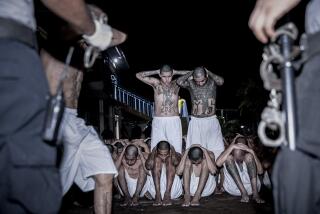On the Eve of Guatemalan National Elections, the Grass Roots Flourish : Latin America: Independents can’t run for Congress or the presidency. But scores of civic committees are driving races for local offices.
Maria Eugenia Urquizu Godoy has always voted out of civic duty. On Sunday, for the first time, she will vote out of conviction.
The middle-aged housewife has finally found a candidate she can believe in: not one of the 19 presidential contenders, but college professor Rigoberto Queme, the independent candidate for mayor in Quetzaltenango, Guatemala’s second-largest city.
Queme is running on the ticket of the Xel-Ju civic committee--one of 166 such committees throughout this country that are backing independent candidates for municipal offices. In the first elections in three decades endorsed by all sectors of society--including guerrillas, Indian rights organizations and the military--voters are looking for alternatives to political parties, whose prestige has been eroded by blatant corruption and collaboration with dictators.
Significantly, the candidate leading the presidential race, Alvaro Arzu, represents a party founded after Guatemala’s return to democracy in 1986 and is running on a platform of honesty and efficiency, based on his success as mayor of Guatemala City in the mid-1980s.
But for many Guatemalans, new political parties are not enough. They want truly independent candidates like those who have run for the top offices in Peru, Poland and even the United States, with Ross Perot’s candidacy in 1992.
When it has come down to actual voting, politicians backed by traditional parties have won the elections every place except Peru, where Alberto Fujimori rose to the presidency in 1990; independent candidates, however, have remained on the political scene in Poland and the United States as respected critics.
But Guatemala’s constitution leaves no room in the political process for independents. Candidates must be backed by parties, with one exception: Civic committees, formed just before the election and disbanded afterward, may run candidates for local office.
Once quaint organizations confined to a score of Indian communities, civic committees have become an important factor in Sunday’s elections. They are expected to win in Quetzaltenango and several other important cities and to bring voters to the polls who might otherwise have stayed home.
*
In addition, there is growing pressure to allow the committees to run candidates for federal office. Congress members have squelched previous efforts to expand the civic committees’ role. But in talks to end a long-running guerrilla war, the rebels are expected to propose that the committees be allowed to nominate congressional candidates.
“The Guatemalan party system does not permit democratic participation,” candidate Queme said. “Small groups run the parties. The committees were created to open a political space.”
Queme sees the revival of the committees as grass-roots proof of Guatemala’s return to democracy after decades of oppression.
“The state does not consider the committees important,” he said. “But we are gaining force.”
Indeed, the number of civic committees more than doubled to 101 in the 1993 elections and rose by two-thirds again this year.
Still, political analysts in the capital tend to dismiss the committees’ significance.
“The parties are not going to give up their hold on power,” said Gabriel Aguilar, coordinator of political studies at the Guatemalan branch of the Latin American Social Sciences Faculty, a respected think tank. Because the parties control Congress, they can squelch constitutional changes that would allow the committees to run candidates for federal office, confining them to local elections.
But local participation should not be underestimated, said Danilo Rodriguez, a former guerrilla who is advising civic committees in four communities in the Pacific coast state of Escuintla.
“The road to democracy is to strengthen local government and the participation of people in local government,” he said. “The committees will encourage people to participate despite the lack of credibility of the political parties.”
*
In the countryside, the committees are receiving growing support outside their traditional Indian bases.
Surama de Juarez, a Xel-Ju candidate for the Quetzaltenango City Council, was canvassing door-to-door for votes one recent Sunday, as she has every weekend since being nominated. A family physician, she is also unmistakably Indian because she proudly wears the traditional embroidered blouse and long wrap skirt.
“We entered a store, and it was not the store we had thought it was,” she said. “The owner was a white woman. We felt uncomfortable but decided to give our talk anyway. She not only let us put a campaign sign in her window--she gave us a donation.”
That is a marked contrast from a generation ago, when the first committees were founded, said her husband, Rene Juarez.
“Indians were allowed to vote but not to participate by running for office,” he said. “Men would wait outside the meetings to beat us up.”
Now, the civic committees also draw support from non-Indians such as Urquizu Godoy.
“I am tired of the political parties,” she said on the ride out to a rural suburb to canvass for votes. “They spend all this money on campaign propaganda, and when they are elected, they steal it all back from the city treasury.”
In contrast, Xel-Ju runs a low-budget campaign. Instead of giving away T-shirts, the committee encourages supporters to bring their own shirts to the modest, two-room campaign headquarters to be stamped with the committee’s logo featuring a drum and flute, the instruments Indians traditionally have used to call meetings.
*
Queme and his ticket of 14 City Council candidates are running on a platform of efficient government and a more equitable municipal tax structure.
A sign outside campaign headquarters states: “We are sick of having the administration of our city be the booty of political parties and politicians who divide it with unscrupulous contractors, cheating the people.”
As Rene Juarez joked: “The servants have risen.”
More to Read
Sign up for Essential California
The most important California stories and recommendations in your inbox every morning.
You may occasionally receive promotional content from the Los Angeles Times.






